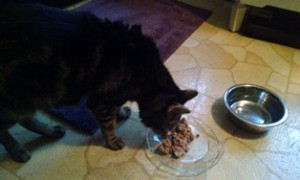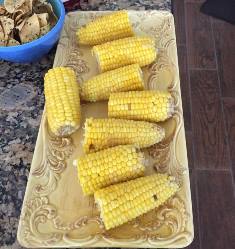As Thanksgiving Day approaches, we want to be sure you are aware of the many foods your pets may appear to crave but should be made off limits to keep them healthy – and that means no treating from the Thanksgiving dinner table, making sure all trash lids are secure, and all tin foil and saran wrapped leftovers are safely stored away from your pet’s eyes and nose.

And don’t forget to inform your Thanksgiving Day guests and all members of your family that Fluffy and Fido need to stick to their own regular pet food diet and not be fed from the dinner table! Folks without pets may not have the same awareness that a pet parent has of what foods may be safe and what may be harmful to your pet. Dogs, especially, will eagerly eat a much wider variety of foods than cats, but let’s keep kitty safe, too, and away from that tempting fatty piece of meat that might cause a digestive upset.
We would like to share a list of what Pet Poison Helpline considers high on their list of reasons for emergency calls during the Thanksgiving holiday. Maybe you should print this out and tape it to your refrigerator or other prominent place in your home so everyone in your household knows the dangers.
Fatty foods – These include butter, bacon, fatty meat drippings, gravies and meat scraps – all pose threats of stomach upset such as pancreatitis. Pancreatitis is an inflammation of the pancreas that can result in clinical signs of vomiting, diarrhea, loss of appetite and abdominal pain. Symptoms may not be immediate and can occur up to 4 days after exposure.
Discarded food items – Turkey trussing and bones can result in obstruction or gastrointestinal injury. Even corn cobs have the same danger and can result in emergency surgery. For those of you who follow our Facebook page, we’ve posted about our patient who suffered this exact issue by swallowing a corn cob earlier this year!

Turkey Brine – Did you know your pet could suffer from salt toxicosis by drinking this salt-saturated solution? Clinical signs are excessive thirst and urination, vomiting and diarrhea. This can potentially result in serious electrolyte changes and brain swelling.
Xylitol – We’ve warned pet parents before about the danger of this sweetener found in candies, desserts, peanut butter, and chewing gum, to name a few. Xylitol can result in a rapid drop in blood sugar in dogs along with liver damage.
Raisins, currents and grapes – These are a serious concern for dogs as they have the risk of resulting in acute renal failure with even small ingestions. Don’t take chances.
Chocolates – Clinical signs include of vomiting, diarrhea, agitation, tremors, and increased heart rate along with potential seizures. Keep all chocolate out of reach!
Nuts – The high fat content poses the same risk of digestive upset and pancreatitis as the other fatty foods mentioned above. Macadamia nuts are more serious and if ingested can result in vomiting, diarrhea, inability to rise or walk normally.

Holiday floral arrangements – This is something we have also warned you about in the past. Often floral arrangements contain poisonous plants such as lilies – cats can die of acute renal failure if any part of the lily plant is ingested. Keep floral arrangements completely away and out of reach by pets. Take no chances. It could be fatal for your pet!

Holiday decorations – Ornaments that humans find festive and pretty to look at are viewed as toys by pets and pose a danger by swallowing. Traditional candles can result in accidental burns while flameless candles contain batteries that when ingested can result in gastrointestinal burns and corrosive injury. We’ve treated dogs in our practice who have ingested batteries which pose a real and present danger year round, not just during the holidays.
Make Thanksgiving Day a Happy Day for your pets! Keep them safe and secure away from harmful foods and situations – share your concern with your family and guests – and everyone enjoys the holiday!
Remember, even though Belle Mead Animal Hospital does NOT offer 24 hour emergency care, should a mishap occur, visit our website Emergency page for guidance on how to proceed to your nearest emergency animal clinic.
Also keep the Pet Poison Helpline phone number handy – 1-800-213-6680 for 24/7 emergency assistance.
Joe Martins, DVM, Belle Mead Animal Hospital

Joe Martins, DVM, Belle Mead Animal Hospital


